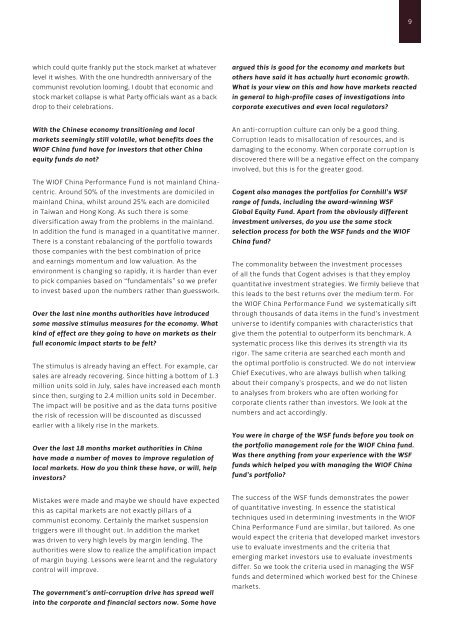You also want an ePaper? Increase the reach of your titles
YUMPU automatically turns print PDFs into web optimized ePapers that Google loves.
9<br />
which could quite frankly put the stock market at whatever<br />
level it wishes. With the one hundredth anniversary of the<br />
communist revolution looming, I doubt that economic and<br />
stock market collapse is what Party officials want as a back<br />
drop to their celebrations.<br />
argued this is good for the economy and markets but<br />
others have said it has actually hurt economic growth.<br />
What is your view on this and how have markets reacted<br />
in general to high-profile cases of investigations into<br />
corporate executives and even local regulators?<br />
With the Chinese economy transitioning and local<br />
markets seemingly still volatile, what benefits does the<br />
WIOF China fund have for investors that other China<br />
equity funds do not?<br />
The WIOF China Performance Fund is not mainland Chinacentric.<br />
Around 50% of the investments are domiciled in<br />
mainland China, whilst around 25% each are domiciled<br />
in Taiwan and Hong Kong. As such there is some<br />
diversification away from the problems in the mainland.<br />
In addition the fund is managed in a quantitative manner.<br />
There is a constant rebalancing of the portfolio towards<br />
those companies with the best combination of price<br />
and earnings momentum and low valuation. As the<br />
environment is changing so rapidly, it is harder than ever<br />
to pick companies based on “fundamentals” so we prefer<br />
to invest based upon the numbers rather than guesswork.<br />
Over the last nine months authorities have introduced<br />
some massive stimulus measures for the economy. What<br />
kind of effect are they going to have on markets as their<br />
full economic impact starts to be felt?<br />
The stimulus is already having an effect. For example, car<br />
sales are already recovering. Since hitting a bottom of 1.3<br />
million units sold in July, sales have increased each month<br />
since then, surging to 2.4 million units sold in December.<br />
The impact will be positive and as the data turns positive<br />
the risk of recession will be discounted as discussed<br />
earlier with a likely rise in the markets.<br />
Over the last 18 months market authorities in China<br />
have made a number of moves to improve regulation of<br />
local markets. How do you think these have, or will, help<br />
investors?<br />
Mistakes were made and maybe we should have expected<br />
this as capital markets are not exactly pillars of a<br />
communist economy. Certainly the market suspension<br />
triggers were ill thought out. In addition the market<br />
was driven to very high levels by margin lending. The<br />
authorities were slow to realize the amplification impact<br />
of margin buying. Lessons were learnt and the regulatory<br />
control will improve.<br />
The government’s anti-corruption drive has spread well<br />
into the corporate and financial sectors now. Some have<br />
An anti-corruption culture can only be a good thing.<br />
Corruption leads to misallocation of resources, and is<br />
damaging to the economy. When corporate corruption is<br />
discovered there will be a negative effect on the company<br />
involved, but this is for the greater good.<br />
Cogent also manages the portfolios for Cornhill’s WSF<br />
range of funds, including the award-winning WSF<br />
Global Equity Fund. Apart from the obviously different<br />
investment universes, do you use the same stock<br />
selection process for both the WSF funds and the WIOF<br />
China fund?<br />
The commonality between the investment processes<br />
of all the funds that Cogent advises is that they employ<br />
quantitative investment strategies. We firmly believe that<br />
this leads to the best returns over the medium term. For<br />
the WIOF China Performance Fund we systematically sift<br />
through thousands of data items in the fund’s investment<br />
universe to identify companies with characteristics that<br />
give them the potential to outperform its benchmark. A<br />
systematic process like this derives its strength via its<br />
rigor. The same criteria are searched each month and<br />
the optimal portfolio is constructed. We do not interview<br />
Chief Executives, who are always bullish when talking<br />
about their company’s prospects, and we do not listen<br />
to analyses from brokers who are often working for<br />
corporate clients rather than investors. We look at the<br />
numbers and act accordingly.<br />
You were in charge of the WSF funds before you took on<br />
the portfolio management role for the WIOF China fund.<br />
Was there anything from your experience with the WSF<br />
funds which helped you with managing the WIOF China<br />
fund’s portfolio?<br />
The success of the WSF funds demonstrates the power<br />
of quantitative investing. In essence the statistical<br />
techniques used in determining investments in the WIOF<br />
China Performance Fund are similar, but tailored. As one<br />
would expect the criteria that developed market investors<br />
use to evaluate investments and the criteria that<br />
emerging market investors use to evaluate investments<br />
differ. So we took the criteria used in managing the WSF<br />
funds and determined which worked best for the Chinese<br />
markets.


